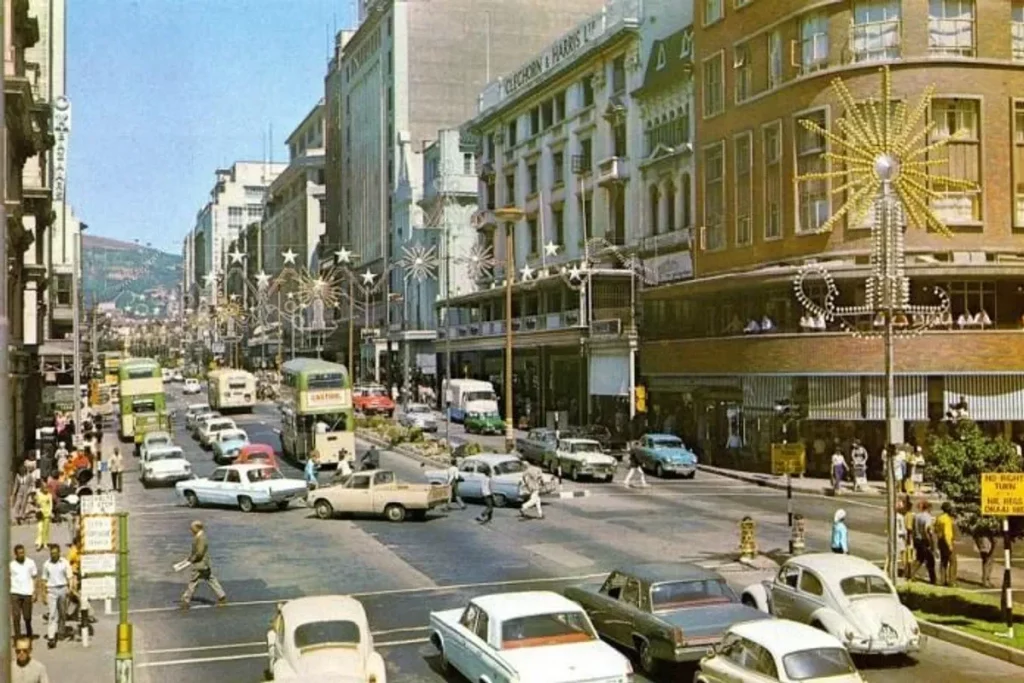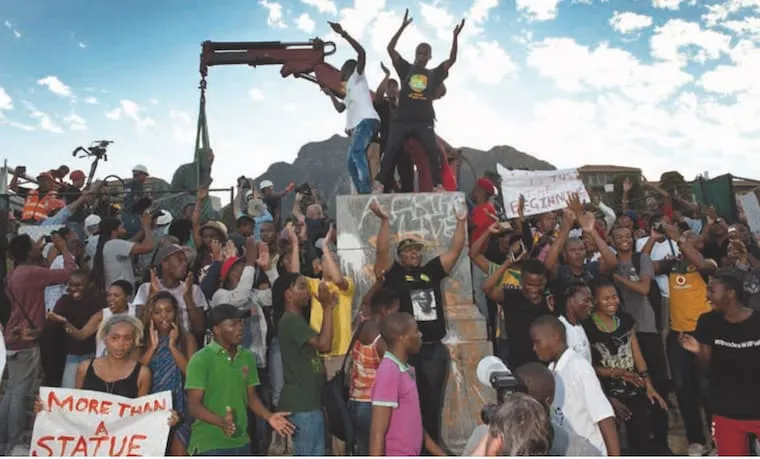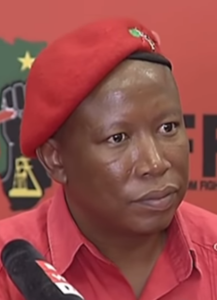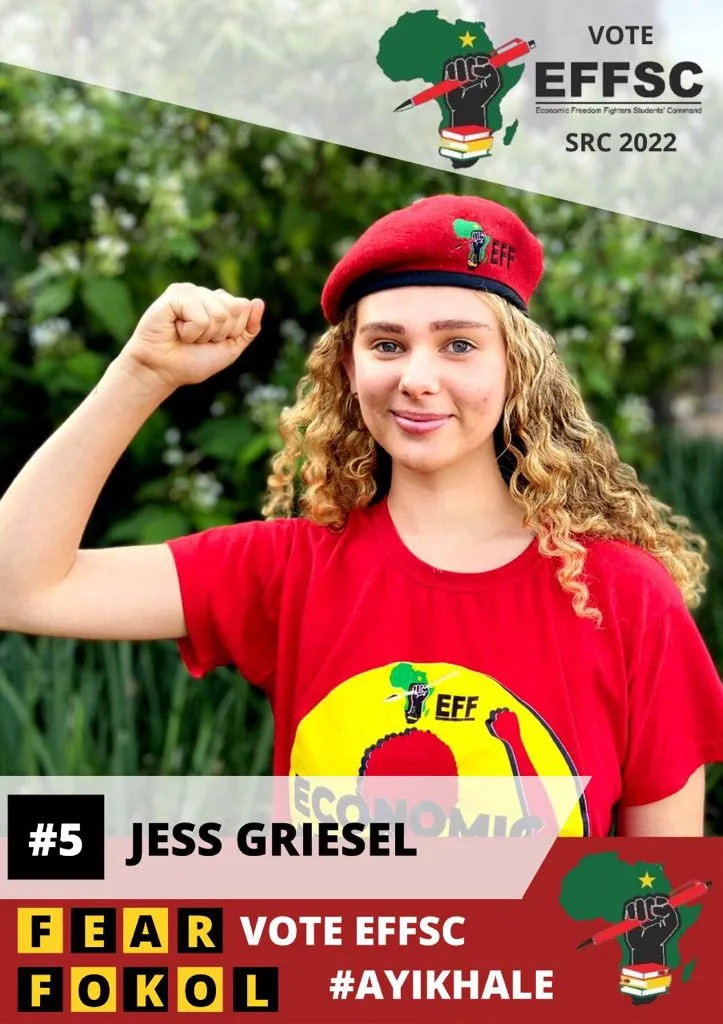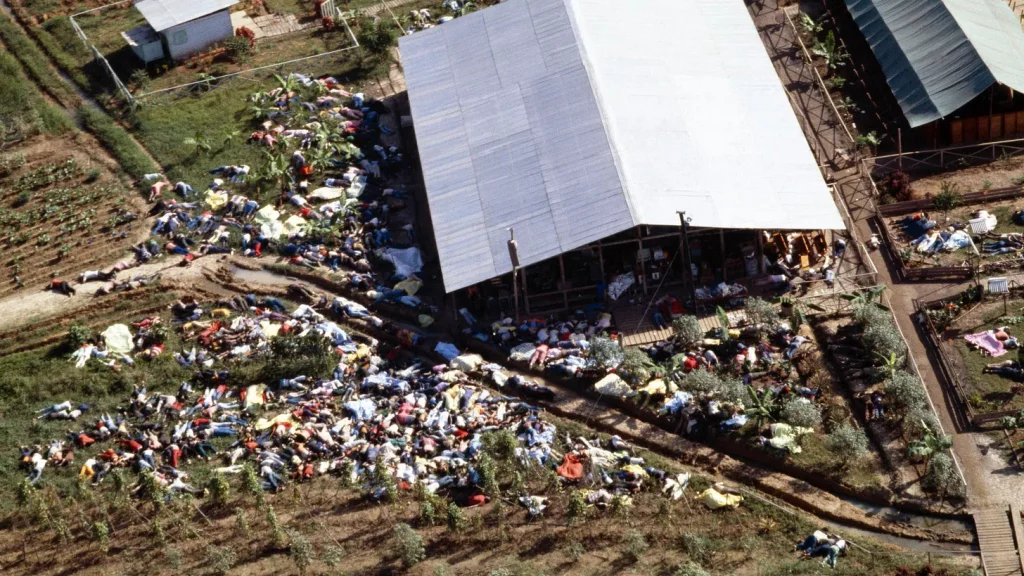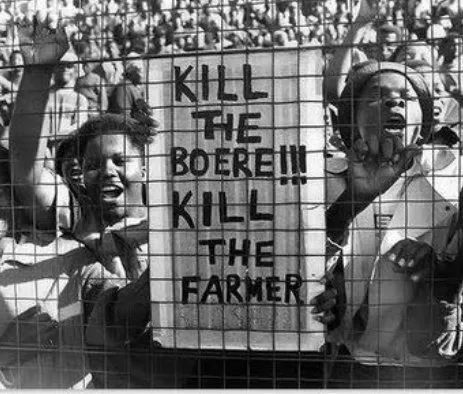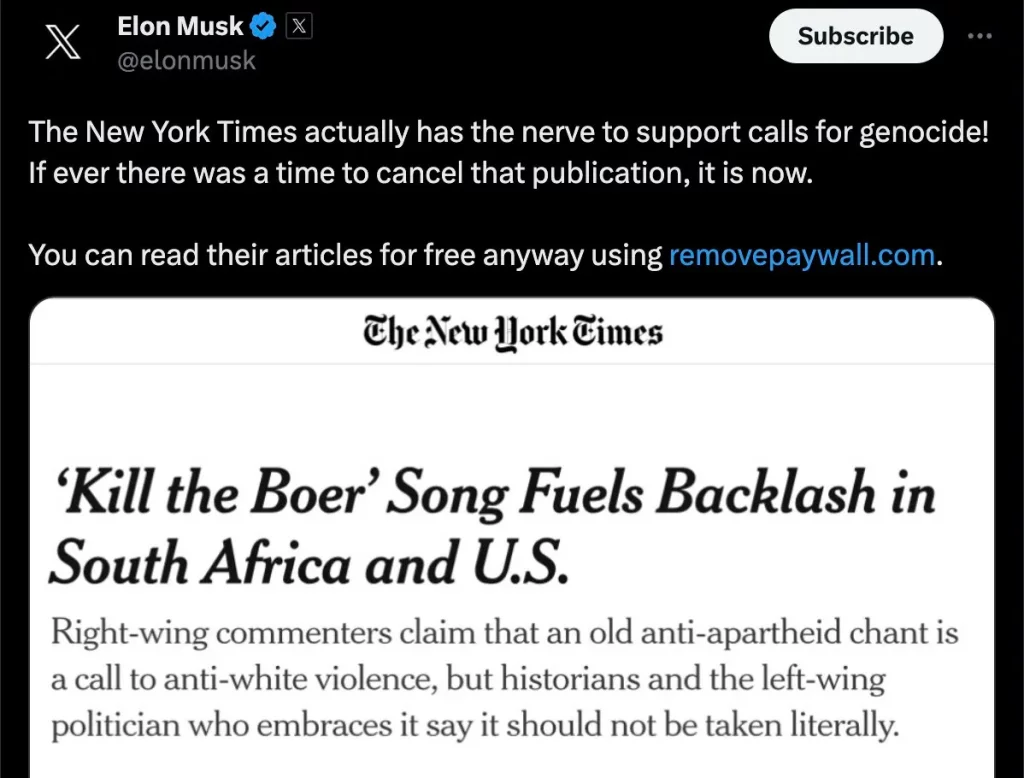South Africa Discredits “Accelerationism”
Posted By Endeavour On In North American New Right | Comments DisabledThe following is reprinted from Endeavour [2]‘s Substack [3]. Check out his Telegram [4] and YouTube [5] channels as well.
Author’s Note: I’m going to put the word “accelerationism” in quotes as to not give the idea more credibility than it deserves.
Probably the most annoying argument I frequently hear from the online Right is that what we need is “accelerationism.” The idea is that the situation within the Western world getting worse is of benefit to us because it will either collapse the system or immediately red-pill the masses and force them into action. Some go so far as to say that we should actively bring about the acceleration of decline — somehow — as a way of bringing about this desired result sooner. I should note that this idea is not typically supported by serious commentators, but rather something you’ll encounter from anonymous accounts on Twitter (aka X) or in far-right Telegram group chats. Nevertheless, “accelerationism” is an idea which at least a number of people who consume dissident Right content subscribe to.
 [6]
[6]You can buy Greg Johnson’s The White Nationalist Manifesto here [7]
This idea also has a history of circulating in far-Left circles. Some Marxists have argued that only once the conditions of the working class are bad enough will the workers’ revolution to overthrow capitalism and bring about an egalitarian utopia happen. The far Right is also susceptible to this faulty line of thinking, assuming that European ethnocentrism will all of a sudden make a furious return once conditions brought about by immigration and multiculturalism get bad enough. I’ve likewise heard the idea of “accelerationism” discussed in both Right-wing and Left-wing anarchist circles, but for the purposes of this essay, I’m going to be addressing this claim as it pertains to the issue of race.
While I don’t think this idea will ever promulgate to the degree where it actually becomes something entertained in mainstream public discourse, I’m writing this for anyone who might have thought along these lines at some point, because I know that some of my subscribers have. I want to dispel the illusion that the decline in the living standards in Western countries constitutes some kind of political victory by virtue of waking more people up to systemic problems and that this will motivate them to do something about it.
In order to discredit the idea of “accelerationism”, look no further than the failing state of South Africa. Under white-minority rule, South Africa was as technologically advanced as any Western nation. Medical innovations such as the CT scan and the first heart transplant came out of South Africa in the 1960s. During the Apartheid era, South Africa also had a formidable military and successfully developed nuclear weapons. It needs to be stated that while South Africa’s white minority enjoyed a safe, First-World quality of life, the black majority still lived in Third World conditions — though they, too, were beginning to gain greater access to modern amenities.
Note: I’m not suggesting that White South Africans should feel any guilt over this.
About 30 years after the end of Apartheid and the assumption of power of the black-ruled African National Congress (ANC), South Africa can no long boast such technological achievements. This year South Africa has had difficulty keeping the power on during its winter months, with blackouts [9] becoming an increasingly common occurrence. As of 2022, the population [10] of South Africa was 80.9% black, 8.8% coloured, 7.7% white, and 2.6% Indian. The white share of South Africa’s population is down from 17.6% in 1985 as a result of lower birth rates and emigration.
As for crime, South Africa had a murder rate [11] of 36.4 per 100,000 inhabitants in 2021. In contrast, the murder rate in Canada in 2021 was 2.07 per 100,000 inhabitants. South Africa is also often referred to as “the rape capital of the world.” While rape rate is far more difficult to calculate than the murder rate, this source [12] puts South Africa at 70.22 per 100,000 inhabitants and Canada at 1.43 per 100,000 inhabitants. It’s important to note that South Africa has always had a much higher crime rate than Western countries, both before and after the end of Apartheid, and crime reached its highest point ever in the 1980s and early ’90s at the end of the Apartheid era, when the country was going through major political turmoil. Crime declined from the mid-’90s through the early 2010s, but has been on the rise again over the past decade. The difference is that South Africa’s white population was largely protected from violent crime by Apartheid’s segregation policies before the 1990s. While whites are still statistically less likely to be victims of violent crime, those protections no longer exist.
I myself actually visited South Africa in 2017. While my trip was an overwhelmingly positive experience, I can say that the ever-present threat of violent crime was palpable. Every middle-class house in cities such as Cape Town or Johannesburg has a wall around it, and the upper-class houses are surrounded by walls topped with electric fencing. Private security companies have, in effect, taken over for the corrupt and incompetent police force. In every major city, their employees can be seen roaming the streets, armed to the teeth.
The phenomenon of white farm owners being brutally attacked on their properties, and in many cases murdered, has been noted both in South Africa and abroad. In 2022 [14], 333 farm attacks reportedly took place, resulting in 50 murders. This figure might not appear significant given that South Africa typically experiences over 20,000 murders a year, but the gruesome nature of many farm attacks, the South African authorities’ relative indifference towards them, and the racial undertones of these crimes have gained them notoriety. While some have attributed farm attacks to general criminality, many Afrikaners are of the belief that these are primarily racially-motivated crimes carried out by black radicals.
Farm attacks have become a hot-button issue in South Africa’s overwrought political climate. The “Rainbow Nation,” as it was dubbed in 1994, has failed to reap the supposed benefits of “diversity,” just as every Western nation which has embraced this creed. Ethnic and racial strife are ever-present in South Africa, three decades on from the end of Apartheid. The division is much more complex than simply black versus white. Both these racial groups are comprised of various ethnicities who have histories of conflict between one another, and South Africa also has sizeable colored and Indian minorities as well who have also found themselves the target of black radicals at times. What has caught the eye of white advocates in the West, however, is the rise of the far-left Black Nationalist party, the Economic Freedom Fighters (EFF).
The EFF is the third-largest political party in South Africa, holding 11% of the seats in Parliament. They have become known for their fiery and frankly genocidal anti-white rhetoric. The EFF’s leader, Julius Malema, made international news recently for singing the controversial South African folk song from the 1980s, “Kill the Boer [16]” in a stadium full of 90,000 supporters. A decade ago [17], the ruling ANC tried to distance themselves from the hateful song. This time around, the ANC hasn’t denounced Malema’s violent rhetoric. He was only denounced in Parliament by the centrist Democratic Alliance (DA) and the right-leaning Freedom Front Plus (FF+). Many have linked these overt calls for violence by the EFF to farm murders throughout the country, several of which happened [18] in the days following Malema’s performance. While not all black South Africans share Malema’s beliefs, it’s clearly a sentiment held by a significant portion of the population.
South Africa has the worst system of affirmative action in the world, known as Black Economic Empowerment [19] (BEE). These policies severely limit the career prospects of white South Africans via the law by hindering their chances of being hired for a job, receiving a promotion, or their ability to start their own business. Similar policies are enforced by universities and professional sports teams, which likewise artificially pass over more qualified white candidates in favor of less-qualified black ones. The ANC government has reportedly passed 116 racially-based laws [20] since taking power in 1994 which discriminate against white South Africans in favor of black South Africans.
The situation which South Africa’s white minority finds itself in is far and away worse than that of the European-descended population of any country in North America, Europe, or Oceania. Demographically, economically, politically, culturally, and socially, South Africa is much worse. And this has happened very quickly. Over the course of three decades, white South Africans have gone from living in First-World conditions to Third-World conditions (though they still maintain a higher standard of living than the black majority).
South Africa’s rate of violent crime dwarfs any Western country’s. People of European descent are a small percentage of the population and falling, yet they continue to be blamed for South Africa’s failings in the post-Apartheid era. While anti-white rhetoric from the Left is reaching alarming levels in Western countries as well, few Leftists feel emboldened enough to outright call for genocide, unlike the far-Left EFF in South Africa. There have been various Leftist professors and racial activists on Twitter who have made such statements, but — as of now — this has only come from select individuals. No mainstream political party in the West has been nearly as brazen in their rhetoric as the EFF, nor would they be nearly as capable of actually carrying out such a crime.
Despite all of this, white advocates in South Africa will tell you that it isn’t so easy to get through to their co-ethnics as you might think. Incredibly, there actually exist white Leftists in South Africa who think that not enough as been done to “fight racism” and “undo the legacy of Apartheid.” They still refuse to acknowledge the existential threat they face. And beyond that, there are tons of white normies in South Africa who, while not as fervently, still believe the mythos of Nelson Mandela and the “Rainbow Nation.” The accusation of “racism” remains a potent weapon used against white people pursuing their own interests in South Africa.
I’ve always hated the Right-wing argument which claim that the reason white Leftists believe what they do is because they live in overwhelmingly white, gated communities away from the consequences of “diversity.” This is true of some of them, especially Hollywood actors or rich boomers, but it is not the case for many. Many white Leftists, especially the younger ones who tend to be more radical in their beliefs, very often live in big multicultural cities, and experience “diversity” and its consequences in their day-to-day lives. But they interpret it through an ideological lens that prevent them from ever questioning the premises which brought this about. This is true in South Africa as well, where people need to live behind barbed wire.
This should totally discredit the argument often heard among the online Right (albeit from less than credible individuals) that “accelerationism” is beneficial because it will automatically red-pill people with reality, and then they’ll do something about it. It doesn’t work like that. The Leftist and anti-racist cult leader Jim Jones convinced hundreds of Americans to drink cyanide- laced Kool-Aid as an act of “revolutionary suicide” in 1978. And this isn’t the only time in history when people have gone so far as to kill themselves in the name of ludicrous religious or political beliefs. The idiom “drinking the Kool-Aid” exists for a reason. There is no specific point where things get so bad for someone that reality suddenly forces them to let go of their deeply-held delusions.
Likewise, it’s foolhardy to believe that a collapse of the system will bring about change, because countries don’t simply collapse one day. You often hear predictions of collapse or civil war bandied about online whenever a country such as the United States or France sees major unrest, as clips of cars burning and stores being looted are posted on social media. Not only does this never happen, it never even comes close to happening. Again, South Africa shows us why. The 2023 French race riots [23] resulted in two confirmed deaths and an estimated $717 million in property damage. The 2020 Black Lives Matter riots in the United States [24] resulted in 25 confirmed deaths and a high estimate of $2 billion in property damage.
 [25]
[25]You can buy Greg Johnson’s White Identity Politics here. [26]
Both of these were dwarfed by the 2021 South African riots [27] in response to the arrest of former President, Jacob Zuma. This unrest had a death toll of 354, with some estimates of the damage in Durban alone of $4.89 billion. And all of this damage was done in only eight days, in contrast to the French riots which lasted 19 days and the American riots which lasted five months. Neither South Africa nor the city of Durban collapsed, and there wasn’t a sudden mass awakening throughout the country.
The way you change hearts and minds is through metapolitics. This is how people of European descent around the world, South Africa included, have been brainwashed into self-negation: through the relentless pathologizing of European ethnocentrism in media and education over the past 60 years. Metapolitics is the way we will return to healthy ethnocentrism, too. While we don’t have the same resources as those who indoctrinated and continue to indoctrinate our people, I am confident that we will be able to reverse this because progress towards this goal has already been made.
As bad as the situation in the country is, we can also look to South Africa for hope. There are a great many white South Africans who are aware of the reality of their situation, have a healthy sense of ethnocentrism, and have taken action. There are probably more of them per capita than in most Western countries, although I can’t find statistics which would prove this. I don’t think this can be attributed to the overall chaotic state of the country as much as it can be attributed to the work of Afrikaner advocacy organizations such as AfriForum and the Orania Movement, as well as representatives of other ethnic groups in South Africa — both white and non-white — who they have allied with.
There needs to be someone there to offer a solution to the disorder if people are going to change their minds. Why is it that Julius Malema’s performance of “Kill the Boer” made international news this month? It isn’t anything new. This song dates back to the 1980s. Here’s Malema performing [28] the same song in 2016, albeit replacing the line “Kill the Boer” with “Kiss the Boer” — something he didn’t do this year, suggesting he feels more emboldened now than he did back then. But Malema isn’t even the most prominent individual to ever engage in such rhetoric. Here’s a video [29] of former President Jacob Zuma singing a similarly genocidal song during his term in office.
In fact, Nelson Mandela himself, who has been built up in the West as the progressive messiah, did the same, even after he had been released from prison. Here’s a video [31] of Mandela partaking in a song pledging to kill all white South Africans — alongside the Jewish Communist, Ronald Kasrils — only to lie through his teeth moments later about “peace,” “love,” and “democracy.” Malema’s flagrant calls for violence are therefore nothing new in post-Apartheid South Africa.
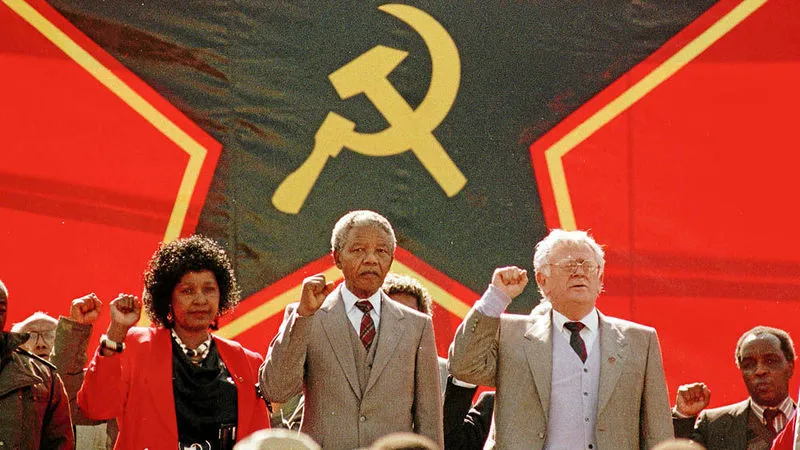 [32]
[32]Nelson Mandela alongside the Jewish Communist Joe Slovo. (There seem to have been a lot of them in South Africa.)
Likewise, the phenomenon of farm murders in South Africa isn’t new. Violent attacks targeting farms was a tactic employed by the ANC in the 1980s during their struggle against the Apartheid regime, and they have been a common occurrence ever since. In fact, farm murders were even more common in the late 1990s and early 2000s, as is the case with South Africa’s generally high rate of criminality. Violence has always been commonplace in South Africa. Malema’s recent performance of “Kill the Boer” is thus nothing out of the ordinary. Yet, this time it attracted a lot more attention internationally.
Elon Musk, who was born in South Africa, accurately accused [33] the EFF of calling for white genocide and asked President Cyrill Ramaphosa why the ANC isn’t denouncing it. Say what you want about Musk — I’m not saying he is “our guy” — but he is the most prominent person to ever speak truthfully about this issue. FOX News also published an article [34] about it. And the New York Times even felt the need to cover the story [35] — in order to make excuses for Malema, of course — which Musk likewise denounced the publication for doing. It can’t be that Musk was unaware of the situation in South Africa prior to last week; it’s his native country, after all.
The reason that more attention has been brought to the EFF’s rhetoric this time around is because of the work that has been done by Afrikaner activists to shine light upon the issues of anti-white sentiment and farm murders in South Africa. It’s also due to the work done by white advocates in the West who have raised awareness of it, both in solidarity with white South Africans and as a warning of the future Western countries could face. Years of metapolitical messaging have begun to push these issues into mainstream discourse. Worsening conditions in South Africa haven’t done this, because the state of the country has been dreadful for decades. Worsening conditions in any country won’t do that; only metapolitics will.
I hope this dispels any notion that you might have had that “accelerationism” is a viable strategy for the Right. It’s not even really a strategy, because it’s not as if there exists a button we can press to accelerate decline. Only those in power can do that. Really, those who push this idea just use it as an excuse to sit around doing nothing but complaining on the Internet — or in some extreme cases, use this as a motive for terrorism. Positive political change won’t come from destruction. It would take decades for any Western country to become as bad as South Africa is today, and as we’ve seen, that does not automatically result in people rising up and bringing about political change.
The Left did not attain political and cultural hegemony in the West through violent revolution. They got there through incremental metapolitical change. It was the filmmakers, the professors, and the journalists who got them there. It was not the wannabe revolutionaries dreaming of the day when the proletariat, beaten down by their oppressor, would rise up, overthrow the bourgeoisie, and create the egalitarian utopia. And when there actually were revolutions, it was those elite actors who made it happen, not the disenfranchised masses. The same will be true for the Right. So, get rid of any notions that a collapse of the system or a great conflict is going to achieve your political goals. Only hard work can do that. This is how the Afrikaners have begun to gain ground in a much worse situation, and this is how it will be done in any Western country.
And the next time you’re arguing with someone on Twitter who is calling for “accelerationism,” you can forward them this article.
* * *
Counter-Currents has extended special privileges to those who donate $120 or more per year.
- First, donor comments will appear immediately instead of waiting in a moderation queue. (People who abuse this privilege will lose it.)
- Second, donors will have immediate access to all Counter-Currents posts. Non-donors will find that one post a day, five posts a week will be behind a “Paywall” and will be available to the general public after 30 days.
- Third, Paywall members have the ability to edit their comments.
- Fourth, Paywall members can “commission” a yearly article from Counter-Currents. Just send a question that you’d like to have discussed to [email protected] [37]. (Obviously, the topics must be suitable to Counter-Currents and its broader project, as well as the interests and expertise of our writers.)
To get full access to all content behind the paywall, sign up here:
Paywall Gift Subscriptions
 [38]If you are already behind the paywall and want to share the benefits, Counter-Currents also offers paywall gift subscriptions. We need just five things from you:
[38]If you are already behind the paywall and want to share the benefits, Counter-Currents also offers paywall gift subscriptions. We need just five things from you:
- your payment
- the recipient’s name
- the recipient’s email address
- your name
- your email address
To register, just fill out this form and we will walk you through the payment and registration process. There are a number of different payment options.

